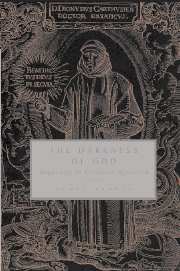Book contents
- Frontmatter
- Contents
- Acknowledgements
- Introduction
- PART ONE TWO SOURCES AND A SYNTHESIS
- PART TWO DEVELOPMENTS
- 6 Eckhart: God and the self
- 7 Eckhart: detachment and the critique of desire
- 8 The Cloud of Unknowing and the critique of interiority
- 9 Denys the Carthusian and the problem of experience
- 10 John of the Cross: the dark nights and depression
- 11 From mystical theology to mysticism
- Further reading
- Index
11 - From mystical theology to mysticism
Published online by Cambridge University Press: 23 November 2009
- Frontmatter
- Contents
- Acknowledgements
- Introduction
- PART ONE TWO SOURCES AND A SYNTHESIS
- PART TWO DEVELOPMENTS
- 6 Eckhart: God and the self
- 7 Eckhart: detachment and the critique of desire
- 8 The Cloud of Unknowing and the critique of interiority
- 9 Denys the Carthusian and the problem of experience
- 10 John of the Cross: the dark nights and depression
- 11 From mystical theology to mysticism
- Further reading
- Index
Summary
It is time to calculate what gains have been made from the preceding discussion and to draw some conclusions. They appear to be the following.
First, in every author we have considered, the metaphors of ‘exteriority’, ‘inferiority’ and ‘ascent’ are central to the description of the progress of the soul towards God. Moreover, in all of them there is a more or less explicit recognition that that imagery must be employed ‘dialectically’ or as I have otherwise put it ‘self-subvertingly’. And we found that the metaphorical embodiment of that dialectic is most commonly that of the self-subverting imagery of the divine light which, through its very excess, causes darkness and unknowing to the soul; hence, in that most Platonic of images, it is a light which is also a darkness, a ‘dazzling darkness’, a ‘cloud of unknowing’.
Secondly, in the elucidation of the complexities of that dialectic it has seemed to me to be helpful to distinguish, first in Denys the Areopagite and subsequently in the others, between first- and second-order levels of description. Indeed, more than helpful; it seems that this distinction is necessary, and that even if it is not a distinction made as such by any of our authors, it is one implied in all the distinctions they do make. We, at least, need it if we are to read the mediaeval apophatic tradition adequately.
- Type
- Chapter
- Information
- The Darkness of GodNegativity in Christian Mysticism, pp. 252 - 273Publisher: Cambridge University PressPrint publication year: 1995



